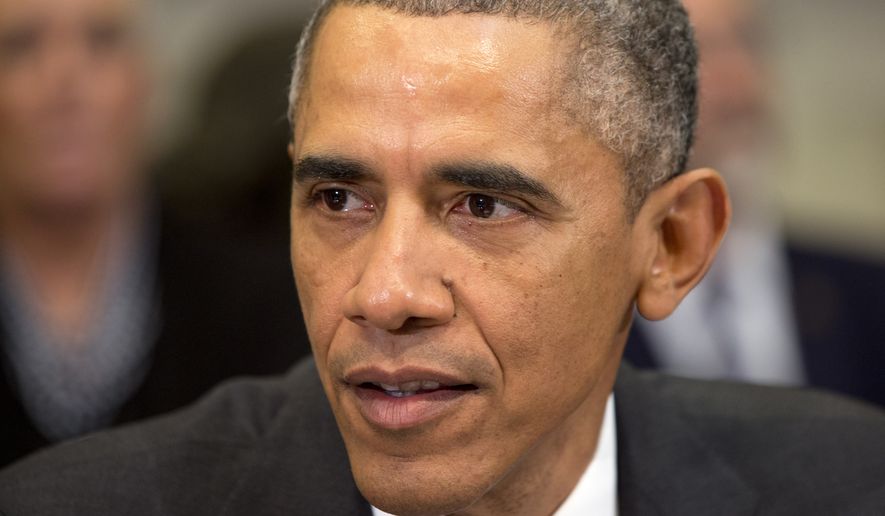When stock market investors demand dividend yields that are substantially higher than interest rates, they are screaming out a message the wider public should note well — financial sophisticates do not believe the economic-growth story that the Obama administration so ham-handedly still tries to sell.
For established companies with long histories of paying regular cash dividends, high-dividend yields are danger signs, particularly when they exceed interest rates on “risk-free” securities such as U.S. government debt.
Ominous dividend signs
After the brutal market sell-off Friday that could continue and even accelerate, dividend yields on common stock issued by 70 percent of the theoretically well-positioned companies that are included in the Dow Jones industrial average exceeded the interest rate of 2.10 percent offered on U.S. government debt with a 10-year maturity.
Some of the dividend yields for five Dow-Jones’ components seemed extraordinarily high. For example, AT&T (T-$32.16) offered a 5.70 percent yield; Verizon (VZ-$45.58) offered 4.80 percent; Chevron (CVX-$102.38) offered 4.10 percent; McDonald’s (MCD-$90.62) offered 3.80 percent and General Electric (GE-$24.89) offered 3.50 percent.
When common stock dividend yields on actively traded shares such as the ones cited above remain so high, experienced investors are voting with their feet — they do not believe management plans will translate into the tangible financial gains that result when consolidated revenues, profits and cash flows reliably and regularly increase.
SEE ALSO: Minimum wage hike killed jobs, hurt low-skilled workers: study
Moreover, looking more carefully through reports filed by publicly traded corporations, experienced investors see that revenues and profits earned only inside America’s borders are either falling, or growing less rapidly than the rate at which households increase in number.
Put in stark terms, under President Obama’s watch, inside America there now are fewer “chickens” in more “pots”, while geopolitical risks surge higher putting international results for most companies in greater jeopardy.
In the latter regard, tensions with Russia over Ukraine and potentially throughout the volatile Middle East involving energy-producing nations seem particularly ominous to those who remember world history.
Trouble in the real American economy
Outside Washington and New York, Americans who do not figure in the cabal among politicians, bankers, and academics understand the brutal economic reality we all now experience.
Official U.S. government statistics unequivocally show that an overwhelming majority of American households are substantially worse off than they were before the Obama administration began “fundamentally transforming” our once-great nation.
SEE ALSO: Obama urges big labor to accept free-trade deal with Asia
To be truly better off year to year, each American household needs to earn more after taxes, and regularly put aside a portion of earnings into savings for retirement. But across the entire economy, American households are earning and saving less since 2008 than they were before the Obama administration assumed stewardship.
Furthermore, the fables of purported economic success spun since 2008 ignore mountainous bills that are finally coming due — no nation can forever pile up debt, spend far more than it earns, and debase its currency, all the while claiming “progress.”
Experts are entitled to opinions and many of them continue spinning empty words into tales designed to seduce us into believing we are much better off now following the Obama Administration for six long years toward “nirvana.”
You are forgiven if you are confused — politicians, pundits, and professors likely are better off given their connections, yet you just lost your job, your costs mostly rise and you have precious little set aside to fund what may be a longer than expected period in retirement.
When it comes to economics and finance, obnoxious and shameless MIT Professor Jonathan Gruber is 100 percent correct — many Americans are ignorant. However, you do not need to count yourself among them nor suffer with them.
Veteran finance specialists understand that carnage is coming to capital markets as our central bank finally and reluctantly forces reference interest rates back up to levels comfortably above proper calculations for underlying consumer price inflation.
In the near-term and through 2017, fortune will certainly not favor Americans who choose to remain economically and financially illiterate.
• Charles Ortel serves as managing director of Newport Value Partners (NewportValue.com), which provides economic research to executives and to investment firms.




Please read our comment policy before commenting.